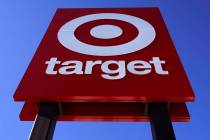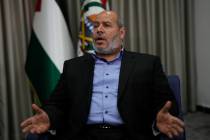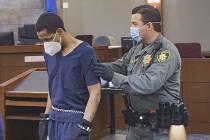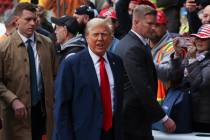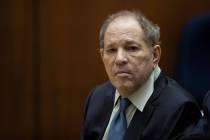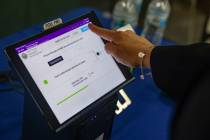Nevada’s fiscal woes among worst
CARSON CITY -- As if you needed more bad news, Nevada's economic downturn now ranks as one of the worst among the 50 states.
A National Conference of State Legislatures report released Wednesday found that tax revenue in Nevada fell by 7 percent in the fiscal year that ended June 30 compared to the previous year.
Nevada ranked No. 3 among the 17 states that reported revenue declines, led by a 7.5 percent drop in Oregon and a 7.3 percent decline in Florida.
While California reported a $4.5 billion decline in revenue, that represented 4.5 percent of its expected revenue total.
The state with the most severe state government spending problem might be Arizona.
It reported a 14.1 percent "revenue gap," which represents the percentage difference between available tax revenue and planned general fund spending.
Nevada was second at 11.4 percent. Only five states had revenue gaps greater than 5 percent.
The NCSL is an association that represents interests of state legislatures. It based its report on statistics collected from state legislative fiscal officers.
Twenty-eight states, including Nevada, expect further declines in the current fiscal year, according to the NCSL report. Nevada already has approved measures to reduce spending by $800 million in the current fiscal year.
Seven states did not participate in the current fiscal year portion of the study, and six of them are states where revenue is falling.
Only 13 states expect their revenue to increase in the fiscal year that ends next June 30.
"We are all going through the same problems," said Ben Kieckhefer, a spokesman for Gov. Jim Gibbons.
He said there is no magic tax that can snap Nevada and other states out of the economic doldrums. Gibbons remains committed in his opposition to any tax increase, Kieckhefer said.
"When the economy is struggling, it is not a good time to raise taxes," he added. "We need to cope with the revenue we have and weather the storm. If there were a recession-proof tax that didn't hurt people, then someone at MIT would have thought of it."
Kieckhefer said Nevada faces a special problem because of its tourist-based economy.
"It is not surprising that we are faced with economic problems when the national economy experiences a downturn," he said.
That is borne out by the report. Florida also is a tourist-dependent state, and its fiscal year 2008 revenue drop was slightly more than Nevada's.
Florida cut spending by more than $800 million and laid off 2,700 state employees. Three other states also laid off state employees.
Hawaii, perhaps the most tourist-dependent state, did not submit its fiscal year 2009 estimates in time to be included in the study. But its legislative analysts predict a decline in tourism over the next two years.
Seven states, including New York and Massachusetts, raised taxes, primarily cigarette taxes, to cope with the revenue declines.
Four states expanded gaming. New Hampshire raised the betting limit and added games of chance. Rhode Island authorized 24-hour gaming three days a week.
But most, like Nevada, slashed spending. Since November, Nevada has cut spending in its two-year budget that ends next June 30 by $1.2 million. That is equivalent to 17.7 percent of its $6.8 billion two-year budget.
The few states where economies showed strong growth were led by North Dakota and Alaska. Both states have abundant oil and gas resources. North Dakota agriculture has been flourishing because of the use of corn in generating ethanol, a gasoline additive.
Contact Capital Bureau Chief Ed Vogel at evogel@reviewjournal.com or 775-687-3901.








